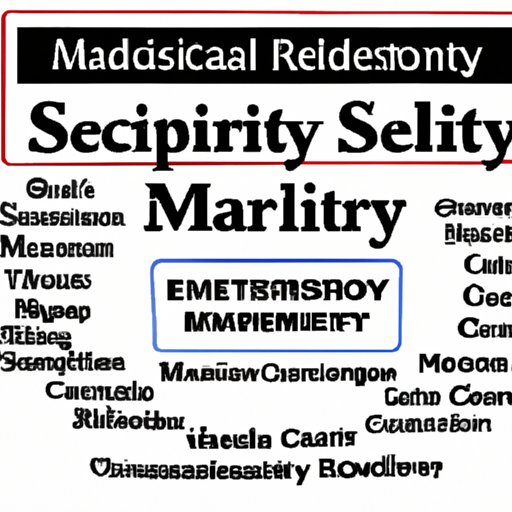Introduction
Mortuary science is an occupation that requires both technical skills and a compassionate approach to providing services to grieving families and individuals. Those who pursue this field must be prepared to perform multiple tasks related to embalming, sanitation, and the administrative aspects of funeral homes. Obtaining a mortuary science degree is the first step in becoming a licensed professional in this field.
This article will provide an overview of the steps needed to get a mortuary science degree. It will cover topics such as researching different programs, understanding degree requirements, exploring career paths, determining cost of tuition and fees, learning about financial aid and scholarship opportunities, networking with other students and professionals, preparing for the licensing exam, and understanding continuing education requirements.

Research Different Programs and Degree Requirements
The first step in obtaining a mortuary science degree is to research different programs. To become a mortician or funeral director, one must complete a two-year associate’s degree program in mortuary science or a four-year bachelor’s degree program. The American Board of Funeral Service Education (ABFSE) accredits mortuary science programs offered at postsecondary institutions across the United States. It is important to make sure the program you are considering is accredited by the ABFSE.
It is also important to understand the degree requirements for each program. Generally, a two-year associate’s degree program includes courses in anatomy, biology, chemistry, restorative art, embalming, and other topics related to funeral service. A four-year bachelor’s degree program includes additional coursework in business management and public relations. Additionally, many programs require students to complete an internship or apprenticeship before graduation.
Explore Career Paths
After researching and understanding degree requirements, it is important to explore potential career paths. According to the Bureau of Labor Statistics, the job outlook for morticians, undertakers, and funeral directors is expected to grow 8% from 2019 to 2029, which is faster than average. Additionally, the median annual salary for these professions was $51,520 in May 2019. It is important to consider these factors when deciding if a mortuary science degree is right for you.
It is also important to consider specializations and certifications available in the field. For example, some states allow morticians to specialize in cremation services. Additionally, the National Funeral Directors Association offers several certifications for funeral directors, including Certified Funeral Celebrant, Certified Preneed Consultant, and Certified Preplanning Consultant.
Determine Cost of Tuition, Fees, and Related Expenses
Once you have identified a program, it is important to calculate the total expense for tuition, fees, and related expenses. Generally, tuition for a two-year associate’s degree program ranges from $5,000 to $20,000. Tuition for a four-year bachelor’s degree program ranges from $25,000 to $50,000. In addition to tuition, there may be fees associated with the program and other related expenses, such as books, supplies, and transportation.
It is also important to research online or hybrid learning options. Many colleges and universities offer the option to take courses online or through a hybrid format, which can reduce the cost of tuition and fees. Additionally, many programs offer discounts for students who live in the same state as the school.
Learn About Available Financial Aid and Scholarship Opportunities
Another important step in obtaining a mortuary science degree is to learn about available financial aid and scholarship opportunities. It is important to research local and national scholarships that are specifically for mortuary science students. Additionally, federal aid and loans may be available for those who qualify.
In addition to traditional sources of financial aid, it is important to consider alternative ways to finance your education. Crowdfunding sites, such as GoFundMe, are becoming increasingly popular for those looking to finance their education. Additionally, many employers offer tuition reimbursement programs for employees.

Network with Other Mortuary Science Students and Professionals
Networking with other mortuary science students and professionals is an important step in obtaining a mortuary science degree. Reaching out to alumni of the program you are considering can be a great way to gain insight into the program and ask questions. Additionally, attending professional events such as conferences and seminars can help you make connections and build relationships with others in the field.

Prepare for the Licensing Exam
Most states require morticians, undertakers, and funeral directors to be licensed. To become licensed, applicants must pass a state-administered examination. It is important to understand the exam requirements for your state and access resources to prepare for the exam. Most states offer study materials and practice tests to help applicants prepare for the exam.
Continuing Education Requirements
Once you have obtained your mortuary science degree, it is important to understand state regulations regarding continuing education requirements. Each state has its own specific requirements for continuing education, so it is important to research what is required in your state. Additionally, research relevant courses and seminars that are available to meet these requirements.
Conclusion
Obtaining a mortuary science degree is an important step in becoming a licensed mortician, undertaker, or funeral director. This article provided an overview of the steps needed to get a mortuary science degree, including researching different programs and degree requirements, exploring career paths, determining cost of tuition and fees, learning about financial aid and scholarship opportunities, networking with other students and professionals, preparing for the licensing exam, and understanding continuing education requirements.
(Note: Is this article not meeting your expectations? Do you have knowledge or insights to share? Unlock new opportunities and expand your reach by joining our authors team. Click Registration to join us and share your expertise with our readers.)
